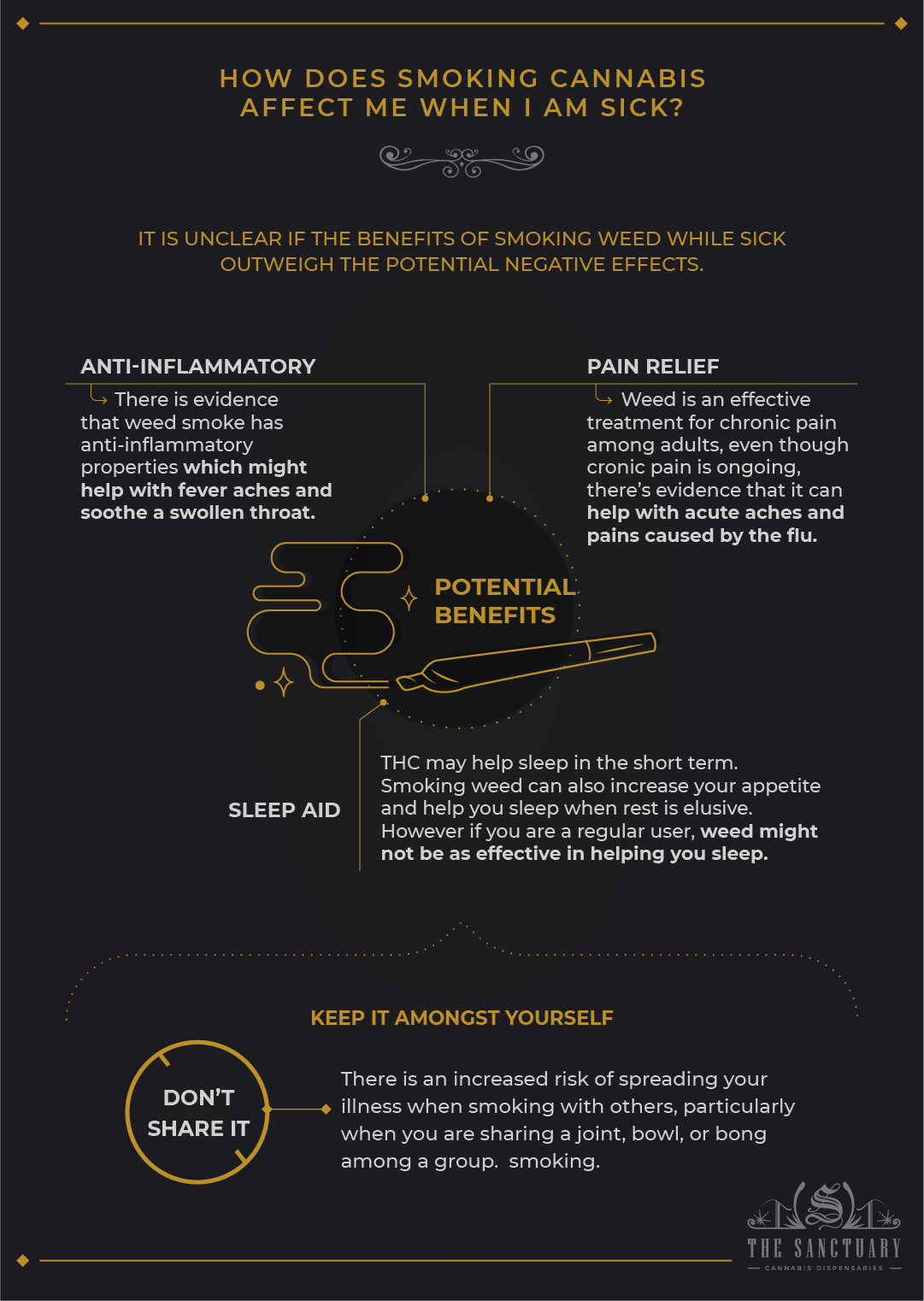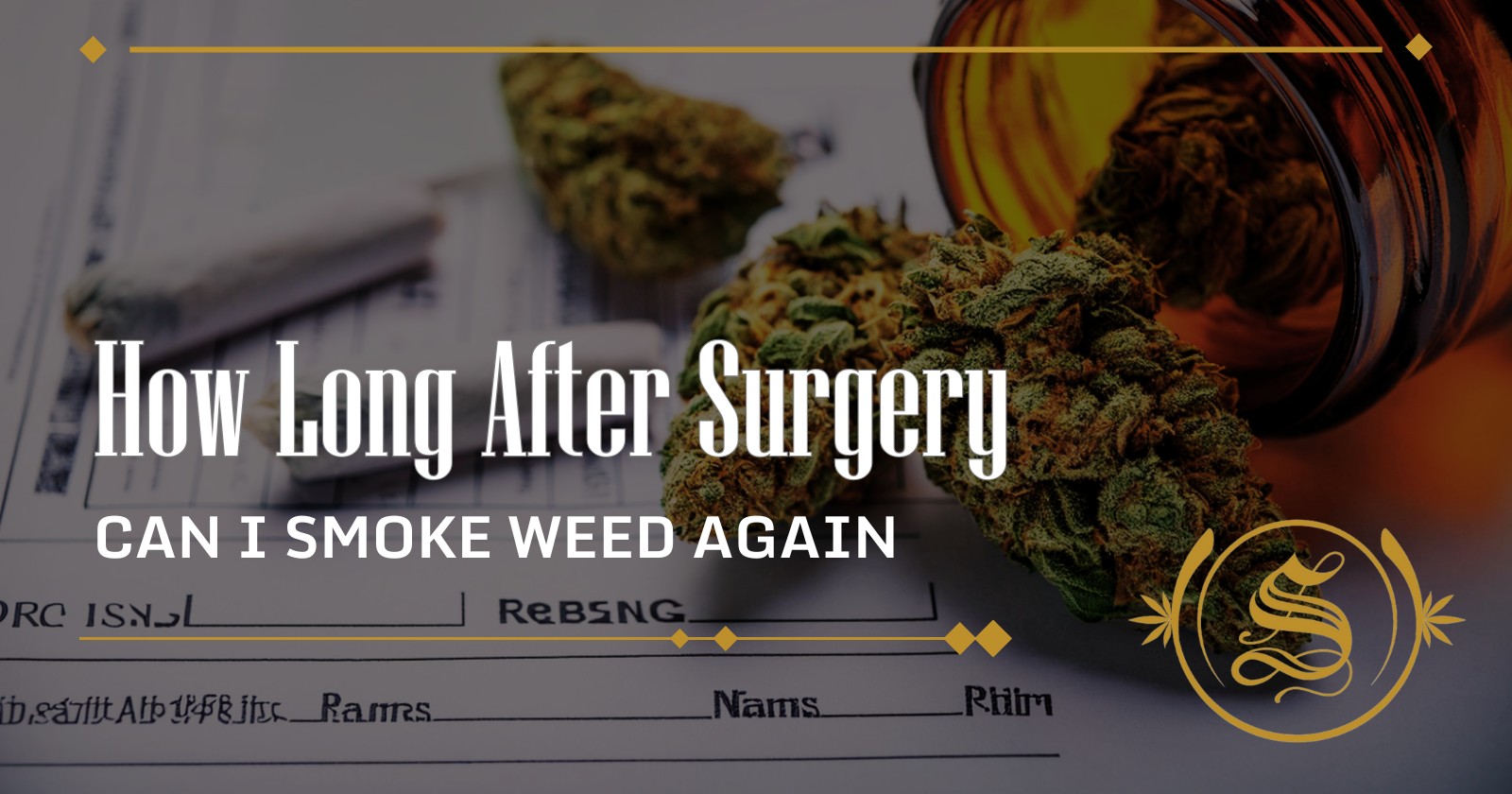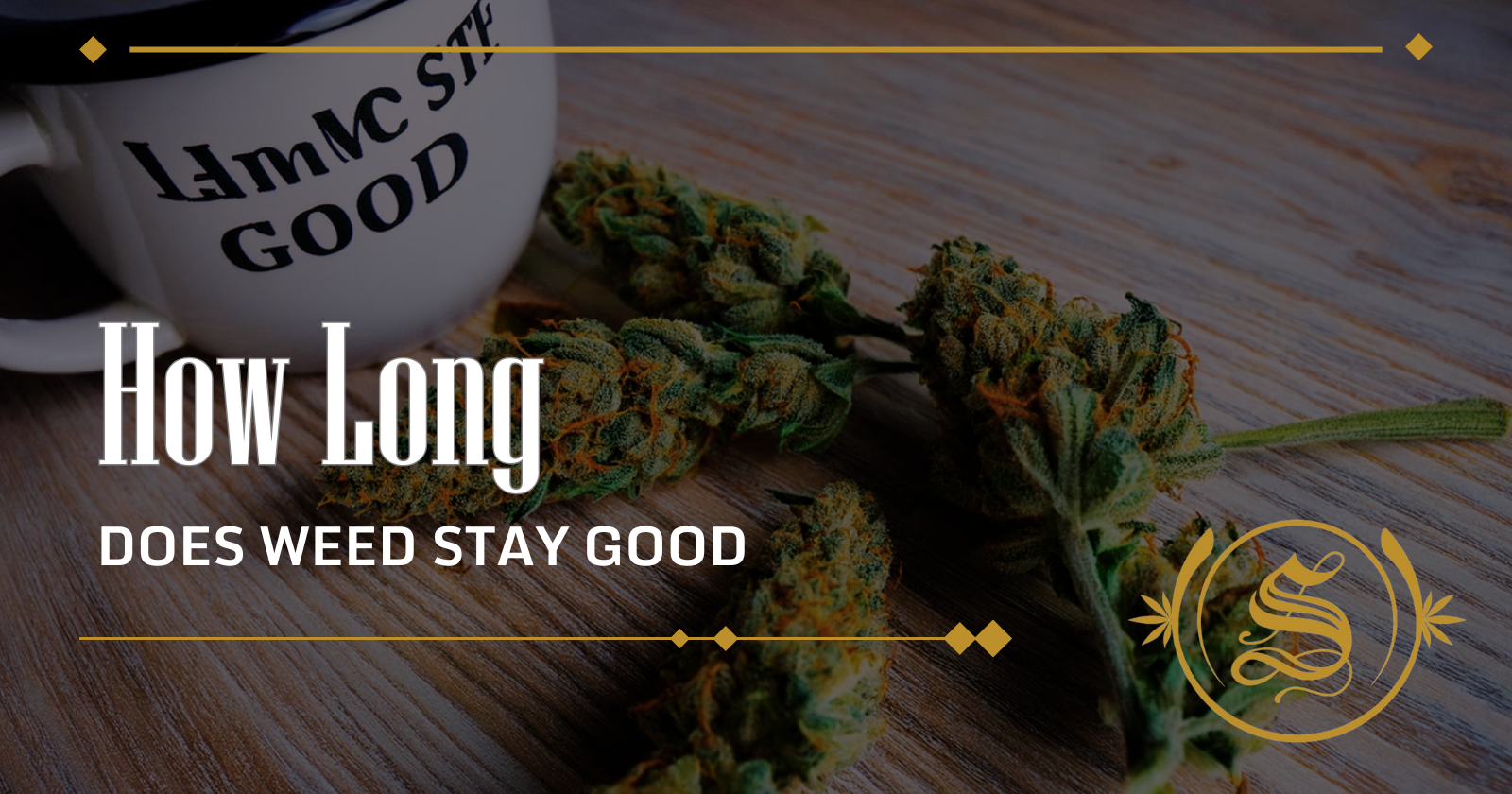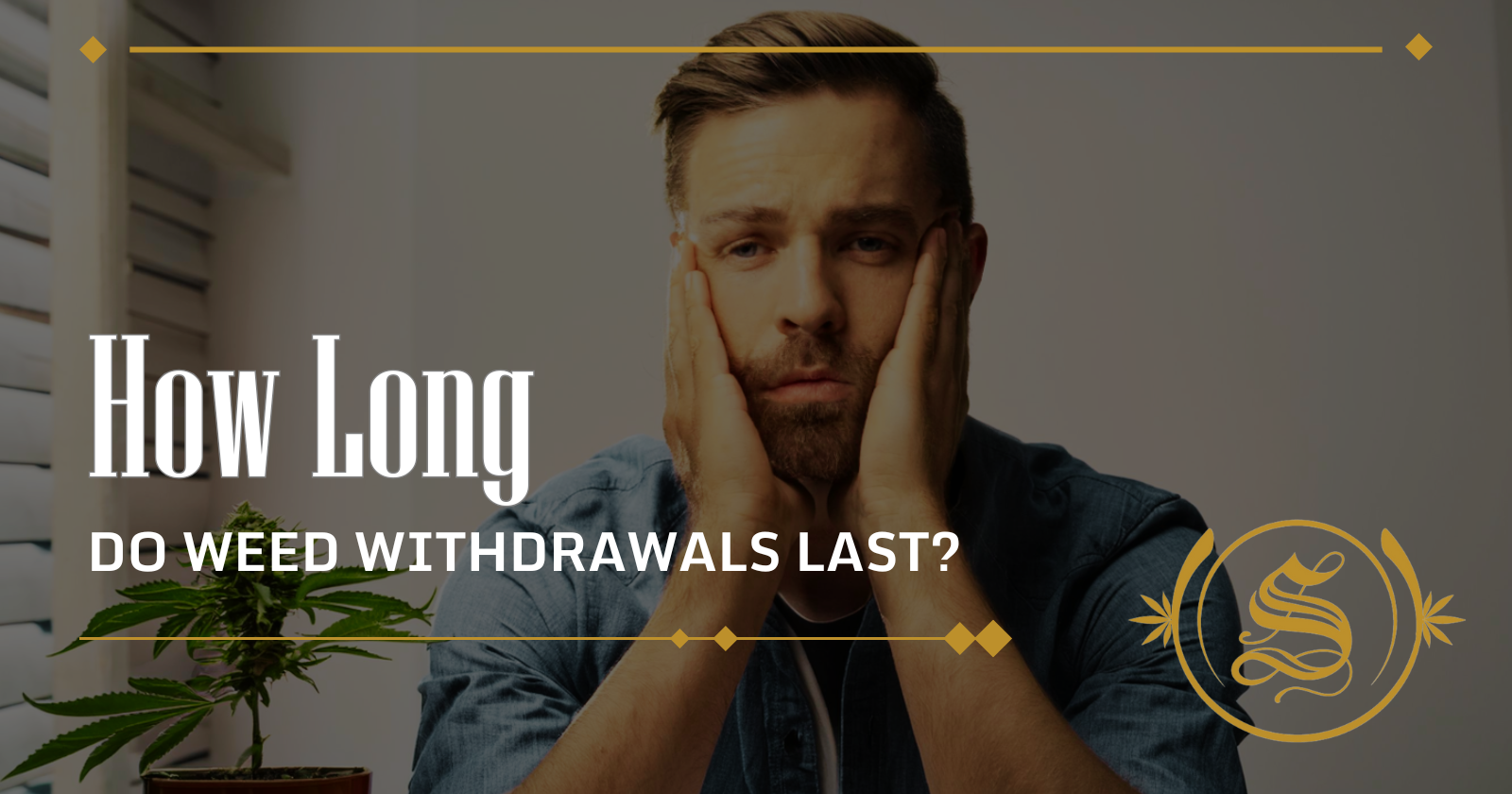Iftikhar Alam
Author
Reviewed by Cannabis Experts
Published on: June 17, 2021 | Updated on: September 3, 2024
Colds and flu afflict everyone at some point in their lives. While these frequent ailments usually are little more than a minor annoyance, they can sometimes knock you off your feet.
Colds and flu are caused by viruses rather than bacteria, which is one of the primary issues. As a result, antibiotics will not help, and the only thing you can do is relax and let your immune system take care of the rest. Most healthy individuals will recover from colds and the flu in approximately five to seven days. But, in the meanwhile, what can you do?
While you wait, you may take action to ease your symptoms and make your life more pleasant. When it comes to a cold or flu, many people grab for the pharmaceutical cupboard first, while some prefer to go the natural route. Some people may be considering using cannabis to alleviate the symptoms of a cold or flu. Is it, however, a smart idea to smoke cannabis when you’re sick?
What causes the common cold?
The common cold can be caused by more than 200 different viruses. After inhaling virus particles, people get symptoms of the common cold. These bacteria generally enter your lungs after being in close proximity to someone who is coughing, sneezing, or just breathing. If you touch a contaminated surface and then wipe your mouth or pick your nose without washing your hands, you are also at risk.
The common cold can occur at any time of year, although infection rates spike in the fall and winter. The dryness of the nasal passages during these months is exacerbated by the absence of humidity, which contributes to infection. A person’s chances of getting a cold are also increased by a number of risk factors. Here are some of the factors:
- Having a compromised immune system
- People either older in age or younger
- Being a habitual smoker
How do common colds affect the body?
Upper respiratory infections are caused by cold viruses. Your immune system responds quickly when virus particles reach the airways. Foreign infections and the body’s own cells will be distinguished initially by white blood cells. These white blood cells start to work as soon as they detect the adversary.
The adaptive immune system begins shortly after that. Antibodies are produced by white blood cells that are particularly tailored to attack the new infection. These proteins indicate that the body will be able to protect itself against the same disease in the future.
You might have a variety of bodily symptoms, such as:
- Cough
- Sneezing
- Stuffy nose
- Fatigue
- Hoarseness
- Earache
- Low-grade fever
The majority of people heal before anything else occurs. It does not, however, go away as quickly for everyone. The following are signs and symptoms of a severe cold:
- Strep throat
- Ear infection
- Chest infection
- Sinusitis
How does smoking cannabis affect me when I am sick?

Smoking cannabis or not if you have a cold or the flu is a personal choice. Cannabis has no effect on the typical cold or flu, according to experts. However, further research is needed to back up any such claims. If you’re already feeling poorly, smoking cannabis can make things worse, but it can also help with muscular pains and inflammation caused by the illness or a fever.
Analgesic and anti-inflammatory properties of cannabis smoking have been demonstrated, which can assist with fever pains and relieve a sore throat. Smoking cannabis can also boost your appetite and help you sleep if you’re having trouble sleeping.
When smoking while sick, one of the most important things to remember is to keep to yourself. When you smoke with others, you run the danger of transmitting your sickness, especially if you’re sharing a joint, bowl, or bong with a group. When it comes down to it, you don’t need to consume cannabis to get the advantages. Instead of smoking, try tinctures or edibles if you have respiratory difficulties.
Although there may be some advantages of consuming cannabis while under the weather, it is unclear if these outweigh the risks. The following are some of the potential advantages:
- Anti-inflammatory: There is evidence that cannabis smoking has anti-inflammatory effects, according to a thorough 2017 assessment. Many cold and flu symptoms are caused by inflammation. The anti-inflammatory characteristics of cannabis may help to alleviate some of these symptoms, but further study is needed to determine the specific benefits.
- Pain relief: According to the same 2017 study, cannabis is an excellent therapy for chronic pain in adults. Chronic pain is a condition that persists. It’s not the same as the aches and pains that come with a cold or the flu. Smoking cannabis, on the other hand, can assist to alleviate discomfort linked with short-term diseases like the flu or a cold.
- Sleep aid: According to a 2017 review of cannabis and sleep research, the active component in cannabis, delta-9-tetrahydrocannabinol (THC), may aid sleep in the short term. Given this, smoking weed may aid sleep, but your sleep pattern may already be disrupted if you’re sick with a cold or the flu. Long-term weed usage, on the other hand, is linked to tolerance to the drug’s sleep-inducing properties. To put it another way, cannabis may not be as helpful at helping you sleep if you are a regular user.
Can smoking weed make a cold worse?
Cannabis opponents may be more inclined to suggest that smoking pot will make a cold worse. There is no evidence that smoking weed prolongs the duration of a cold or impairs the body’s capacity to fight it. However, other studies show that consuming cannabis may worsen cold symptoms.
In a 2018 study, low-quality evidence was identified associating weed smoking to respiratory symptoms such as coughing, wheezing, and mucus production. If a person already has these symptoms as a result of a cold, smoking cannabis may make them worse.
While some believe that smoking relieves inflammatory symptoms, others argue that the heat and smoke exacerbates them.
Another disadvantage of consuming cannabis when sick is that it may exacerbate symptoms like dizziness. This is due to the fact that smoking weed can cause your blood pressure to drop quickly, leaving you feeling light-headed or dizzy. While this may not be a typical concern for seasoned smokers, beginner smokers who are currently fighting an illness may be more vulnerable.
Furthermore, some people may have nausea or stomach discomfort as a result of cannabis (particularly edibles). If you’re already sick, this is the last thing you want to happen.
Can you smoke weed and take cold medication together?
You might be asking if it’s okay to use cannabis and cold medications at the same time if you want to get the most relief from your cold symptoms.
While there are no known interactions between cannabis and over-the-counter cold medicines, taking the two together should be avoided. Both cannabis and certain cold medications can make you sleepy, so combining the two might make you feel even more sluggish.
As a result, it may be better to select one or the other, especially if you have important things to do during the day.
Best ways to use cannabis to treat a cold
Cannabis may be consumed in a variety of ways, which is very helpful. Even better, the majority of them don’t entail blowing hot smoke down your painful, cold-infected throat.
- Make some cannabis tea: When you’re sick with a cold, a warm cup of tea may do wonders for your spirits. To alleviate your discomfort, try mixing a little cannabutter into your tea. Cannabis tea eliminates the need for inhalation and delivers more potent effects than smoking.
- Cannabis topicals: Fatigue and aching muscles are frequent symptoms of the common cold. It just so happens that topical CBD may be able to help prevent these problems. It can more directly address the root of the problem because it is applied directly to the skin as a gel, lotion, or balm.
- Edibles: Edibles allow consumers to avoid smoking by delivering cannabis straight into the circulation via the digestive system. Due to their lengthy metabolic pathway, edibles take longer to take effect, but the effects are typically considerably more prominent. You may even create cannabutter at home to add high quantities of THC, CBD, or both to your favorite food.
- Vaping: Vaping at low temperatures preserves every cannabinoid in the bud or concentrate, unlike smoking. The cannabinoids and terpenes can be vaporized without burning plant compounds by heating just past the decarboxylation point. Because there is no combustion, inhaling cannabis is considerably easier on the throat.
The content provided on this blog is for informational purposes only and does not constitute medical, legal, or professional advice. Cannabis use is subject to local laws and regulations, which vary widely by jurisdiction. Always consult with a healthcare professional before starting any new treatment or altering an existing treatment regimen. The authors and publishers of this blog are not responsible for any actions taken based on the information provided herein. Use cannabis responsibly and in accordance with applicable laws. This blog is intended for adults aged 21 and over. The Sanctuary Dispensaries D186, D187.








